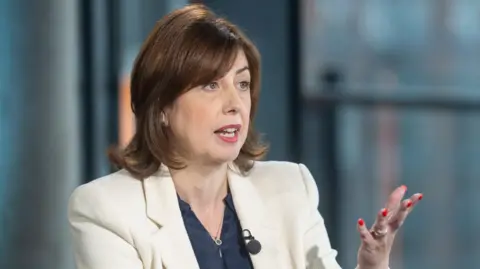Kate WhannelPolitical reporter
 PA Media
PA MediaLucy Powell has been elected as deputy leader of the Labour Party, by 87,407 votes to 73,536.
Her political life started very early. Powell’s mother went into labour with her on the day of the general election in 1974.
She even delayed going into hospital to make sure she could vote first.
“We used to say ‘she was in Labour and she voted for Labour’,” Lucy Powell told the Political Thinking podcast.
At the age of nine, her father, a Labour activist, recruited her to help with the party’s campaigning efforts. Her dad rewarded her with a one pound note.
Powell grew up in Didsbury, Manchester, an area which has been variously dubbed the “stockbroker” or “muesli” belt following a few years of gentrification.
“It is posh now, it was not that posh then,” she has said.
Of the 200 people at her sixth form, she says she was the only one to be accepted to Oxford University – not an achievement that made her happy at the time.
“I cried the day I got the offer,” she says. “I didn’t want to go.”
In the end, she did go to Oxford to study chemistry but only lasted one year before heading to King’s College London, where she said she “felt more comfortable”.
“As a northern comprehensive girl arriving in Oxford in 1993, I was a duck out of water.”
“Harry Potter had not been written then, but it was like Hogwarts,” she told the i newspaper, adding that for a teenager who spent weekends clubbing at the Hacienda, the “stuffy environment” of Oxford’s Somerville College did not suit her.
After leaving university, she embarked on her political career, going to work for Labour MP (and Oscar-winning actress) Glenda Jackson and later Beverley Hughes, another Labour MP.
Between 1998 and 2005, she worked for Britain in Europe, a group campaigning in favour of the UK’s membership of the EU.
In 2010, she ran Ed Miliband’s successful bid to lead the Labour Party and continued working for him as his deputy chief of staff until 2012, when she won a by-election to represent the safe Labour seat of Manchester Central.
A year later she was promoted to the shadow cabinet and continued to serve in different frontbench roles until 2016.
She had been one of a few party centrists to stay in the shadow cabinet when Jeremy Corbyn, who came from the left of the party, unexpectedly became Labour leader.
However, in 2016 she quit in protest at his leadership and backed an ultimately unsuccessful coup attempt by Owen Smith.
She only returned to the shadow cabinet in 2020, when Sir Keir Starmer took over as leader and appointed her as shadow housing secretary.
When Labour won the 2024 election, she became Leader of the House of Commons, whose main job is managing government business in Parliament, as well as modernising Parliament and improving working conditions for MPs and staff.
In the major reshuffle that followed Angela Rayner’s resignation in September, Powell was one of the few ministers to be sacked from government.
She described it as “kind of a shock but not a total surprise”.
Asked if the prime minister gave her a reason for her demotion, she said “No, I did ask but he just said ‘I need to make some changes’.”
Reflecting on the possible reason, she said “I know I am not in the in-crowd. I don’t play some of the parlour games”.
“I have fed back things that in hindsight – I thought I was doing the job I was suppose to be doing – but perhaps it was feedback people didn’t want to hear.”
“Some of what I was feeding back – especially how difficult legislation on welfare was going to be to land – I thought I was doing that to be helpful but maybe it was a message people didn’t want to hear.”
Ahead of the vote, she said that if she did win the deputy leadership, she did not want to be given a government role, adding that she did not want to be “constrained” by a cabinet job.
She said she viewed the deputy leader role as being a “bridge between the leadership and the members, a constant feedback loop” as well as a “campaigner-in-chief”.
Asked about her vision for Labour, she said her Manchester Central constituency was made up of “classic Red Wall constituents – white working class, older voters” and “younger, liberal, left-leaning voters who haven’t got that long-standing cultural loyalty to Labour”.
The question for Labour, she said is “how we unite them together”.
“I don’t think tacking one way or tacking the other is how we do that.”
She argued that Labour could achieve that by building a “fairer economy, an economy that works in the interests of the many, not the few”.
Citing decisions to cut the winter fuel payment and welfare, she said: “Some of the mistakes we have made, some of the unforced errors have given a sense that we are not on the side of ordinary people.”
Disclaimer : This story is auto aggregated by a computer programme and has not been created or edited by DOWNTHENEWS. Publisher: BBC






